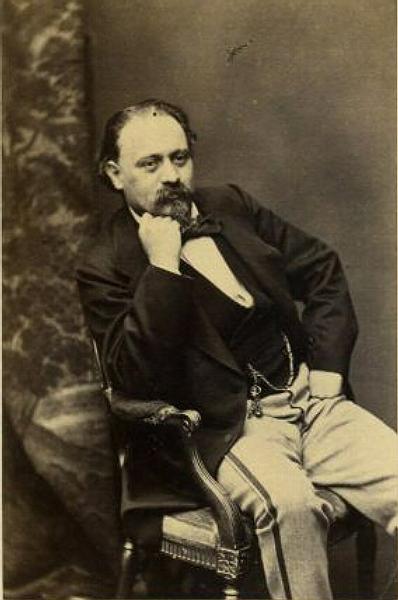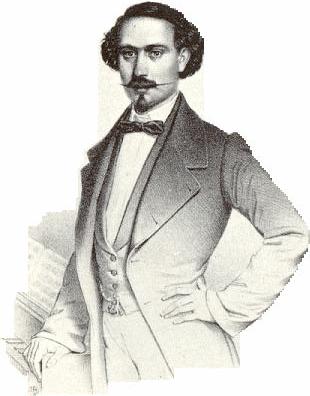Pietro Mongini
29 October 1828 Rome – 27 April 1874 Milano
Mongini's father was a lawyer, and so also the son studied law: reluctantly, though, and he gave it up as soon as he could and enrolled in
the papal army. The European revolution of 1848 even found an echo, though one year late, in the States of the Church, and a republic was
founded in Rome; Mongini joined the young republic's armed forces, and when the papal power was restored in 1850, he was discharged from
the army. He decided to have his voice trained in Macerata, where he also made his debut in spring 1851 – as a basso. Not being
overly successful, he switched to tenor the following year, and had his first notable successes in Genova at the Teatro Carlo Felice in
winter 1852/53.
Mongini excelled not only as a singer, but also as a businessman. Already from February 1853, he availed himself of the services of a good
booker, who had to guarantee him a fixed salary each month.
Very soon, the Duca di Mantova became his most famous role. In winter 1853/54, he started his international career in Lisbon and Madrid.
In 1855, he sang around Italy (Rome, Florence, Naples, Ancona), and in September left for Paris, where he had a contract at the
Théâtre Italien; he scored enormous success there. In 1856 and 1857, he was back to Italy: Ancona, Forlì, Bergamo,
Florence, Torino, Modena, Reggio Emilia, Padova, Venice.
From 1857 to 1862, he divided his time between St. Petersburg and London (Drury Lane and Her Majesty's), and from 1862 to 1873, between
London (where he now also sang at Covent Garden), Lisbon and Vienna (Kärntnertortheater); to Italy, he returned every now
and then to sing at La Scala (first in 1858, debut role: Arnold, then again in 1860 and 1869), once each also in Venice (1868) and
Bologna (1869). He also returned to Paris and Madrid. His fees were astronomical, and made him a rich man. Historical currencies are
merely numbers for us, but relations make clear how much he really asked (and got): in 1868, La Scala refused to pay him 38'000 francs
for a production of La forza del destino, because that fee was considered too high; but when he returned to St. Petersburg in
1870/71, he received 80'000 francs. And when he was chosen to sing Radamès in the world premiere of Aida in Cairo in December 1871,
he was paid 125'000 francs! His Radamès was a triumph. He returned to London; in 1872, he was once more in Paris, in March 1873 in
Edinburgh (with the troupe of Her Majesty's Theatre), and in winter 1873/74 in Egypt. Upon return, he died in Milano at 45 years old.
His repertory knew almost no limits. It ranged from Almaviva to Éléazar, from Rossini's Otello to Hüon, from Tonio in
La fille du régiment to Max, from Don Ottavio to Don Carlo, from Lyonel to Jean de Leyde, from Elvino to Arrigo...
Reference 1: Treccani, Dizionario biografico degli italiani, vol. 75, Roma 2011; reference 2: Kutsch & Riemens, reference 3
La favorita al S. Carlo di Lisbona
Mongini, the famous tenor had a similar triumphant evening (i.e. similar to Borghi-Mamo). His soft, melodious, fascinating singing conveyed in the aria "Spirto gentil", rendered by him with such passion, a smoothness that nobody else can equal and that brought tears to the eyes of the listeners. This evidence proves the success that he obtained.
Il trovatore, November 1865
Pietro Mongini nella Sonnambula
The voice of this tenor is one of the most beautiful that I have ever heard; essentially bright, round, smooth, secure, and capable of singing the parts of tenore serio and the ones of demi-charactère. (...) His triumph in La sonnambula was very brilliant as confirmed by the applause, the shouts, the ovations calling him before the curtain numerous times.
Il trovatore, 3 January 1857
|
Pietro Mongini
Pietro Mongini, the tenor with a powerful voice, creator of powerful impressions, wanted by all the major theaters, applauded by the audiences of all major capitals, died in a matter of few days from an implacable heart illness. Returning from Cairo, Mongini felt the first symptoms of the disease. This artist, rich thanks to lavish earnings from his hard work, surrounded by a loving family, died before he could enjoy the fruit of his labors. He had a sumptuous villa built on the Lago Maggiore where he intended to finish his life with his spouse and children that he adored. It was a dream, and the poor Mongini could not enjoy the compensation of retirement after a life of not easily obtained triumphs. The funeral will take place next Wednesday with grand pomp.
Il mondo artistico, 4 May 1874
|
Go Home
|

